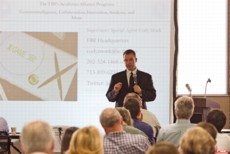Home > Press > FBI seminar educates about research protection
 |
| FBI Supervisory Special Agent Cody Monk presents at the FBI Academic Alliance Seminar last week at UMSL. The Center for Nanoscience held the event. (Photo by August Jennewein) |
Abstract:
A case of a university professor prosecuted for transferring controlled defense technology to foreign national graduate students was used as a cautionary tale during a recent FBI Academic Alliance Seminar presented by the Center for Nanoscience at the University of Missouri-St. Louis.
FBI seminar educates about research protection
St. Louis, MO | Posted on July 31st, 2012J. Reece Roth, a former engineering professor at the University of Tennessee in Knoxville, was found guilty of allowing two foreign national students, one from China and the other from Iran, access to sensitive data and equipment from a U.S. Air Force contract. His actions violated the Arms Export Control Act, which prohibits the export of defense-related materials to a foreign national or nation. Roth is currently serving a four-year prison term.
More than 150 private sector employees and faculty and staff from UMSL and other universities attended the seminar. It brought them together with local and federal law enforcement agents from Washington, D.C., Missouri, Illinois and Kansas to discuss security issues relevant to colleges and universities. The topics included conducting business overseas, research technology protection and cyber safety.
Nasser Arshadi, vice provost for research at UMSL, welcomed the informational seminar.
"In this country, through universities and the private sector, we invest tremendous amounts of money and time on developing technologies that matter a lot to us, and protecting such technologies is quite important," Arshadi said. "Protecting intellectual property is a significant challenge."
The takeaway that Supervisory Special Agent Cody Monk wanted the audience to get was that they need to call the FBI if they suspect some wrongdoing and "get ahead of it."
"If you think there is a violation, we'll come in and look at it," he said. "We're not going to hammer you. Our goal is for this stuff not to walk out of your university and end up in China."
In 2005, the FBI created the National Security Higher Education Advisory Board composed of 19 university presidents and chancellors. They meet regularly to discuss national security matters that intersect with higher education.
####
For more information, please click here
Copyright © UMSL
If you have a comment, please Contact us.Issuers of news releases, not 7th Wave, Inc. or Nanotechnology Now, are solely responsible for the accuracy of the content.
| Related News Press |
Law enforcement/Anti-Counterfeiting/Security/Loss prevention
![]() With VECSELs towards the quantum internet Fraunhofer: IAF achieves record output power with VECSEL for quantum frequency converters April 5th, 2024
With VECSELs towards the quantum internet Fraunhofer: IAF achieves record output power with VECSEL for quantum frequency converters April 5th, 2024
![]() Researchers’ approach may protect quantum computers from attacks March 8th, 2024
Researchers’ approach may protect quantum computers from attacks March 8th, 2024
![]() New chip ramps up AI computing efficiency August 19th, 2022
New chip ramps up AI computing efficiency August 19th, 2022
![]() How randomly moving electrons can improve cyber security May 27th, 2022
How randomly moving electrons can improve cyber security May 27th, 2022
Legal
![]() 180 Degree Capital Corp. Issues Open Letter to the Board and Shareholders of Enzo Biochem, Inc. February 4th, 2021
180 Degree Capital Corp. Issues Open Letter to the Board and Shareholders of Enzo Biochem, Inc. February 4th, 2021
![]() Nanogate: Meeting of creditors on November 4, 2020 September 4th, 2020
Nanogate: Meeting of creditors on November 4, 2020 September 4th, 2020
![]() SUNY CNSE and Albany Law School Partner to Create First-of-its-Kind Nanotechnology Education and Training Program November 5th, 2013
SUNY CNSE and Albany Law School Partner to Create First-of-its-Kind Nanotechnology Education and Training Program November 5th, 2013
Govt.-Legislation/Regulation/Funding/Policy
![]() NRL charters Navy’s quantum inertial navigation path to reduce drift April 5th, 2024
NRL charters Navy’s quantum inertial navigation path to reduce drift April 5th, 2024
![]() Discovery points path to flash-like memory for storing qubits: Rice find could hasten development of nonvolatile quantum memory April 5th, 2024
Discovery points path to flash-like memory for storing qubits: Rice find could hasten development of nonvolatile quantum memory April 5th, 2024
![]() Chemical reactions can scramble quantum information as well as black holes April 5th, 2024
Chemical reactions can scramble quantum information as well as black holes April 5th, 2024
Announcements
![]() NRL charters Navy’s quantum inertial navigation path to reduce drift April 5th, 2024
NRL charters Navy’s quantum inertial navigation path to reduce drift April 5th, 2024
![]() Discovery points path to flash-like memory for storing qubits: Rice find could hasten development of nonvolatile quantum memory April 5th, 2024
Discovery points path to flash-like memory for storing qubits: Rice find could hasten development of nonvolatile quantum memory April 5th, 2024
|
|
||
|
|
||
| The latest news from around the world, FREE | ||
|
|
||
|
|
||
| Premium Products | ||
|
|
||
|
Only the news you want to read!
Learn More |
||
|
|
||
|
Full-service, expert consulting
Learn More |
||
|
|
||








